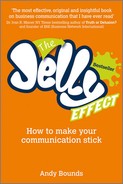How many times have you been excruciatingly bored when listening to a presentation?
How many times have you been itching to get away from someone at a networking event, as they drone on and on?
How many times have you been aggressively sold-to and thought, 'I'd rather be somewhere else ... anywhere else. Just not here.'
I'll bet it's hundreds of times. It certainly is with me. And with every person I've ever asked these questions to.
But, what about the other way around ... when it's you who's presenting, who's networking, who's selling?
Do you ever bore people to death? Do you drone on when you should shut up? Do you sell in a way that comes over as too aggressive?
Have you ever felt that sickening feeling when presenting: 'Oh no, I'm losing the audience ... they look so bored ... they're looking round the room ... they're fidgeting ... and I've still got 10 minutes to go ... I'll speed up and get it over'?
When networking, have you ever seen the person you're speaking to constantly glance over your shoulder to find someone else to talk to?
Or, when selling, have you ever known that your potential customer is just not interested? In fact, they have totally switched off ...
Again, I bet you have. Everybody has.
But why is this? Why doesn't business communication work? Why can't people keep their audiences listening to them?
Because of one simple reason:
Think about it. It's true. Do any of these (totally irrelevant to you) things sound familiar?
presentations that begin with the presenting company's year of formation, number of offices and staffing levels;
networking conversations that include a lengthy description of the other person's company, their product range, infrastructure and history; or
sales pitches that give a full, excruciatingly detailed description of how the product works (much of which you just don't need or even want to know).
Totally, utterly irrelevant to you. But you hear them all the time.
And, hand on heart, you probably do it too.
When you speak like this, it's very much like filling a bucket with jelly, and flinging it at the other person, hoping some of it will stick.
Some will, sure. But most won't. And it's doubly inefficient. It wastes your effort, money, resources and that priceless commodity... time. And that of the people you talk to.
But there's an even bigger problem with 'jellying' someone. When you're on the receiving end, when it's you all this jelly is being flung at, you feel like you're on the receiving end of a big wet, useless barrage. A needless barrage. You feel like a target, not a person.
It puts you off doing what they want ... from buying into them and their ideas.
And flipping it round, when it's you 'jellying' someone else, they don't always do what you want either. Or buy into you. Or your ideas.
But imagine how much more you could achieve if you could overcome all this. Imagine if you knew how to say only the stuff that was 100% relevant to your audience.
Can you see how much more impact you would have?
Saying the right things in the right way – with no jelly – would help you get better results than ever before.
You'd be better at talking to others, at presenting, at networking, at selling. You would excel in interviews, meetings, pay-rise discussions ...
The benefits to you would be endless. You would have better business relationships, better personal relationships. Your business would grow much faster. You would make more money. You'd feel less frustrated by inefficient communication than you do now. Your communications would be quicker, more dynamic. You'd feel a real buzz of success, experience less of the dreaded feeling 'there's one that got away'. The list goes on and on ...
Because, when you think about it, to succeed you only need to answer 'yes' to two questions:
Are you good at your job?
Given that you are good at your job, do you get the results somebody as good as you should get?
Now I assume that, if you answered those two questions honestly, you'll have answered 'yes' and 'no'. If this is the case – and 100% of people I have asked these two questions do answer in this way – there's only really one skill you need to turn your answers into 'yes, yes' ...
Note
For you to achieve the results someone with your abilities should get ...
... the only skill you need to master is ...
... the ability to persuade others how good you are.
You simply need to convince others of your skills, your ability to help them ... then watch your business grow.
And that's what you'll learn from this book. I'll show you how to master 'the only skill you need': how to communicate persuasively, so that your communications work – every time.
By the time you have finished this book, you will know how to say only relevant stuff to others, so that you never 'jelly' anyone again.
You'll learn what I have learned from speaking to my blind Mother, where it's essential that I communicate with her in such a way that she understands everything in seconds.
Because she doesn't have time for irrelevant jelly.
Nor do the people you talk to.
